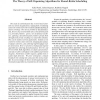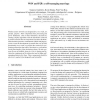20 search results - page 2 / 4 » Self-Organizing Sleep-Wake Sensor Systems |
SASO
2007
IEEE
13 years 11 months ago
2007
IEEE
The study of synchronization has received much attention in a variety of applications, ranging from coordinating sensors in wireless networks to models of fireflies flashing in...
ARCS
2005
Springer
13 years 10 months ago
2005
Springer
Data fusion concepts are a necessary basis for utilizing complex networks of sensors. A key feature for a robust data fusion system is adaptivity, both to be fault-tolerant and to...
GECCO
2005
Springer
13 years 10 months ago
2005
Springer
This article describes a mathematical framework for characterizing cooperativity in complex systems subject to evolutionary pressures. This framework uses three foundational compo...
SASO
2007
IEEE
13 years 11 months ago
2007
IEEE
The future mass deployment of pervasive and dense sensor network infrastructures calls for proper mechanisms to enable extracting general-purpose data from them at limited costs a...
SASO
2008
IEEE
13 years 11 months ago
2008
IEEE
Wireless sensor networks are designed for a very wide, yet specific, purpose. Their components have processing and power limitations. Due to these limitations, decisions by runni...


